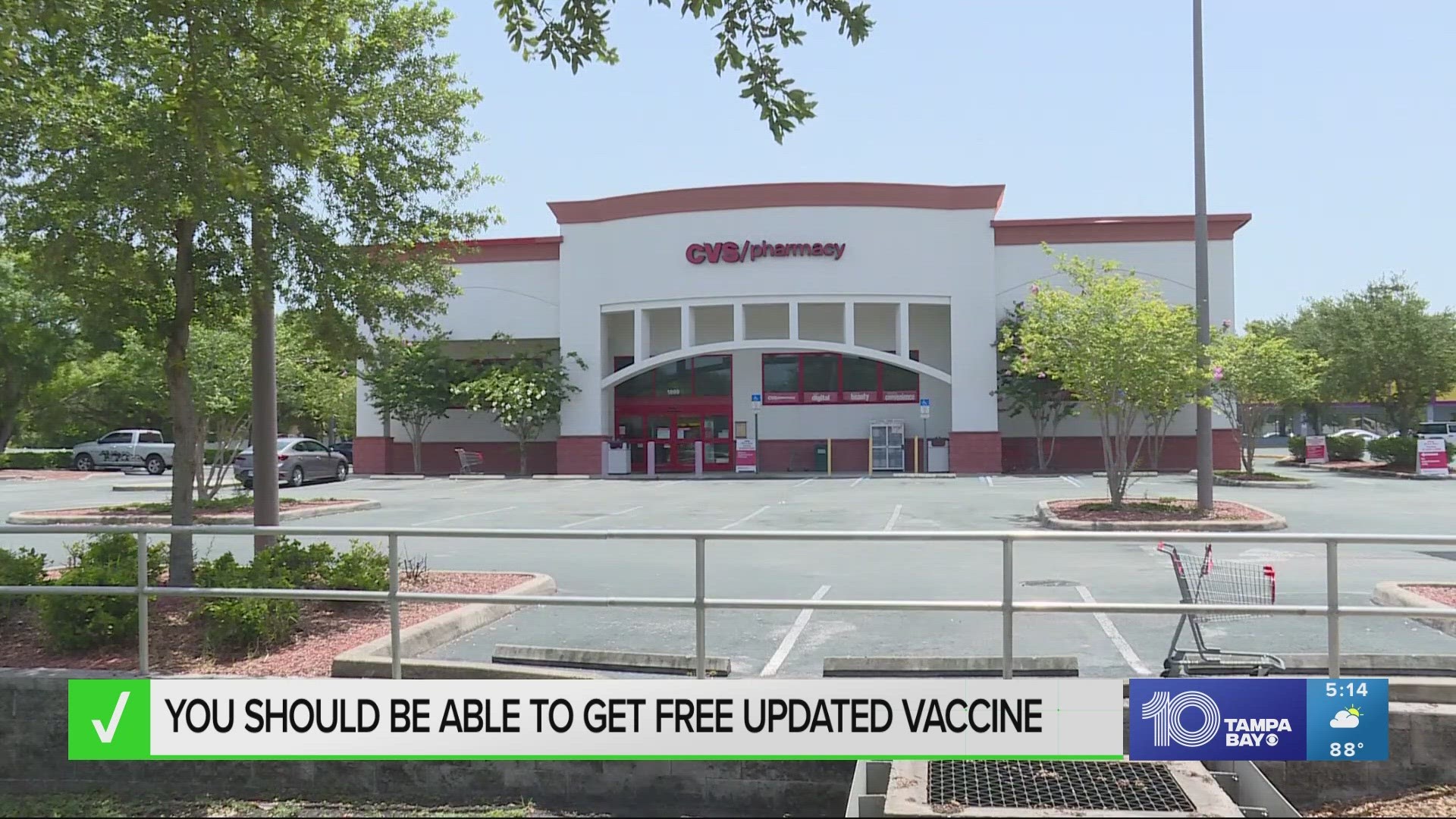ST. PETERSBURG, Fla. — Updated COVID-19 vaccine shots for the fall are now available nationwide.
The FDA and CDC approved and authorized the new shots from Moderna and Pfizer as cases and hospitalizations are increasing.
The new shots are like previously approved formulas but are updated to target the XBB variants — strains descended from the original Omicron variant — which became dominant last winter.
But for the first time since becoming available during the pandemic, the federal government is no longer covering the cost of the vaccine for everyone.
Janona D. in Seminole said she went to a CVS on Sept. 15 to get her updated shot but was told it wasn’t covered by her Medicare plan. She wound up paying nearly $200 out of pocket.
THE QUESTION
Will the updated COVID-19 vaccines still be free?
THE SOURCES
- Centers for Disease Control and Prevention (CDC)
- Centers for Medicare and Medicaid Services (CMS)
- U.S. Department of Health and Human Services (HHS)
- AARP
- CVS
- UnitedHealthcare
- Jennifer Kates, Kaiser Family Foundation (KFF)
THE ANSWER
Yes, Medicare covers the updated COVID-19 vaccines but VERIFY found some payers are still updating their systems.
The updated shots should remain free for most Americans even though the federal government is no longer covering the cost.
WHAT WE FOUND
The CDC recommends everyone six months of age and older get the updated COVID-19 vaccine.
Both Pfizer and Moderna have said they are pricing each vaccine dose at more than $100, according to CBS News.
While the COVID-19 public health emergency is officially over, you likely still won’t have to pay out of pocket to get it.
Medicare, Medicaid
People with Medicare coverage will continue to have access to COVID-19 vaccinations without out-of-pocket costs. The Medicare.gov website says COVID-19 vaccines fall into the category of preventative services covered by Part B.
Those with traditional Medicare coverage pay nothing if their doctor or other qualified healthcare provider accepts an assignment for giving the shot, a spokesperson for the Centers for Medicare and Medicaid Services told VERIFY.
People with Medicare Advantage (MA) should contact their plan for details about payment but will pay nothing if they receive their vaccinations from an in-network provider.
But the new vaccines have new insurance billing codes. Some payers are still updating their systems, a CVS spokesperson told VERIFY, and may not yet be set up to cover the updated COVID-19 vaccines.
“If this happens, our pharmacy teams can help patients schedule an appointment for a later date,” the spokesperson said.
A spokesperson for Janona’s provider said all UnitedHealthcare Medicare Advantage plans cover COVID-19 vaccines at no cost, including the latest COVID-19 booster approved by the FDA.
UnitedHealthcare encourages members who experienced an issue at the pharmacy to contact UnitedHealthcare by calling the number on the back of their member ID card.
Private insurance
Insurers are required to cover COVID-19 vaccines within 15 days of their being recommended by the CDC under a law passed early in the pandemic.
So, for Americans with insurance, COVID-19 vaccines will remain free through in-network providers. But if you go out-of-network, you might have to pay out of pocket, according to Jennifer Kates with the Kaiser Family Foundation (KFF).
Kates notes some insurance plans – like short-term or “skinny” plans – are not subject to these requirements because they provide limited coverage.
Uninsured
The CDC is launching what it calls the “Bridge Access Program” to ensure uninsured or underinsured adults still have a way to get the vaccine for free.
The U.S. Department of Health and Human Services (HHS) says the CDC will purchase COVID-19 vaccines and send them to local healthcare providers, health centers and certain pharmacies with the funds necessary to provide the vaccinations for free to those who qualify. The CDC says it will negotiate with CVS, Walgreens and eTrueNorth to participate in this program.
Also, the CDC’s Vaccines for Children program covers the costs of vaccines for children whose parents or guardians may be unable to afford them, including uninsured and underinsured children.
CBS News and VERIFY’s Emery Winter and Ariane Datil contributed to this report.

